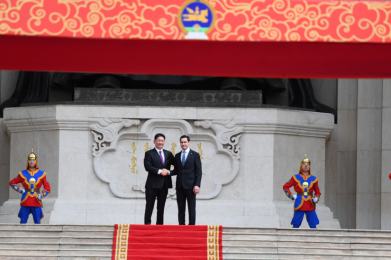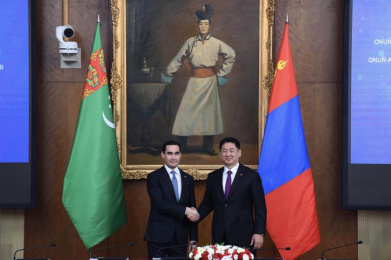Turkmen-Pakistani dialogue as a factor in strengthening the interconnectedness of Central and South Asia
01.06.2025 | 14:58 |The reception by President Serdar Berdimuhamedov of Chairman of Pakistan Senate Syed Yousuf Raza Gilani, as well as the talks of the Pakistani delegation with the leadership of the Foreign Ministry and the national parliament in Ashgabat became an important event demonstrating the political will of the two countries to expand cooperation and another step towards rapprochement between Central and South Asia.
The visit of the Pakistani delegation to Ashgabat is not only bilateral in nature, but also clearly fits into a broader strategic context - deepening the interconnectedness between the two Asian macro-regions.
Thus, during the meetings, a whole range of issues of partnership in the political-diplomatic, trade-economic, transport-communication, electrical and fuel-energy spheres were touched upon, which indicates a systematic approach of the parties to building sustainable interaction.
Particular attention during the meetings was paid to parliamentary diplomacy as an effective tool for supporting interstate dialogue. According to both sides, the formation and development of inter-parliamentary mechanisms – such as parliamentary friendship groups – allows to give cooperation continuity and consistency in political and legal approaches.
The relevance of the negotiations held is particularly increasing in the context of the growing complexity of regional processes and the need for coordination across a wide range of areas-from ensuring security and developing transport logistics to the sustainable use of energy resources.
Turkmenistan and Pakistan act as key links in the formation of a strategic bridge connecting Central and South Asia. In this regard, such large-scale initiatives as the TAPI gas pipeline project, the development of international transport corridors and digital infrastructure are of particular importance. All this creates a solid foundation for the formation of a sustainable zone of economic growth, energy interconnectivity and logistical integration between the regions.
An additional factor in rapprochement is Pakistan's support for Turkmenistan's international initiatives, including the proclamation of 2025 as the International Year of Peace and Trust. Participation of Islamabad in such initiatives opens up the prospect of building a joint foreign policy based on the principles of neutrality, trust and respect for sovereignty.
Against the backdrop of global fragmentation and increasing international turbulence, the task of forming sustainable regional pillars of stability, trust and mutual understanding is becoming especially urgent. Central Asia, with its rich natural resources and advantageous geographical location, is increasingly striving to diversify its foreign economic relations and international logistics routes.
In turn, Pakistan, as an important player in the South Asian region, with access to the Indian Ocean through the Arabian Sea, and also being part of the China-Pakistan Economic Corridor, is a strategically important partner for Central Asia in building the southern direction of interconnectivity.
As a result, the negotiations held in Ashgabat with the Pakistani delegation at the highest, parliamentary and foreign policy levels should be viewed not just as an exchange of opinions, but as a timely and meaningful contribution to the architecture of interregional integration.
The negotiations became a point of convergence of the interests of Ashgabat and Islamabad, contributing to the intensification of interregional cooperation, bringing closer the implementation of the common goal - the construction of an interconnected, secure and prosperous space from the Caspian to the Indian Ocean.
Shiri SHIRIEV, Bekdurdy AMANSARYEV, Center for Strategic Studies, IIR of the MFA of Turkmenistan











